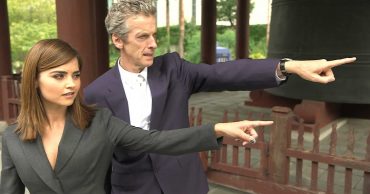
I’m extremely thrilled with this season of Doctor Who so far. Last season seemed like it was figuring out which story types worked the best for Capaldi, and a good amount of them felt boring or off compared to some of the episodes Matt Smith and David Tennant had during their runs as The Doctor. Season 9 seems to have settled into an extremely comfortable groove and has been creating great episodes that deliver great performances from Capaldi as well as some extremely clever and fun episodes. This week’s “The Girl Who Died” is yet another part one in a two episode series, and it does a great job of fitting in a full story that is communicated very well over the course of an hour. The reason that these two-part episodes work so well is because each episode can stand on its own and work individually.
I’ve talked a lot about how alien they have made the Doctor so far this season, which is something I really like. Back during Matt Smith’s run as the Doctor, I felt as though he was so charming that they ran with that characteristic and forgot that he’s not a human. I absolutely loved Matt Smith, but I think it’s a little more interesting to watch the things that Capaldi’s doctor struggles with, which is what this episode gave us. As we know, the Doctor has to follow the unwritten rules of time that determine which situations he can meddle with. Most of the time, he has to be rational and leave people to die or suffer despite every bone in his body wanting to save everyone.
Capaldi’s Doctor is one that has no problem being an alien and bottling up his emotions in the hardest of times. More than once we’ve watched Clara yell at him to do something and he has to say no. “The Girl Who Died” really wrestles with the idea that in order to save the day, people might die. We see the Doctor get stuck with the problem of facing off against a warrior race of aliens whose leader is posing as a fake Odin who is ready to do battle with this Viking town. The Doctor really has no idea how to save a community that had all of its strong warriors killed and he is legitimately concerned that he won’t be able to save anyone.
For once the Doctor is struggling with his emotions, which is great to see. Most episodes have the Doctor coming to some light bulb above the head solution that leaves everyone escaping alive. While that does happen in this episode, it feels more satisfying or rewarding because of the general care towards the people. This continues to extend right up until the episode’s ending when the lovable Ashildir dies. The Doctor decides that he’s tired of being the alien who always follows the rules. I think that it is phenomenal that they decided to call back to “The Fires of Pompeii” episode where Peter Capaldi was a supporting character. The Doctor understands why “he chose this face,” and how it represents ideas of things like hope and goodness. Ashildir is a good person who didn’t deserve to die, especially for something like helping the Doctor and saving her people. The Doctor knows this isn’t fair but has to wrestle with the idea of going against his rules.
Capaldi’s performance during this episode was amazing like usual. When everyone discovers that Ashildir has died, the Doctor is visibly angry and upset, which is rare. Not only did the episode have him already emotional in his attempt to save these people, but now the one he became the closest with suffered because of his plan. Her death ignites a rage in the Doctor that pushes him to the point of not caring how he comes across to everyone else. The Doctor is one of those characters who feels like he has to be strong for both himself and his companions because he knows best. The Doctor loves humans because of there instant ability to feel for or want to save people. His companions always remind him that it’s good to have feelings and care about things, which we finally see unleashed in “The Girl Who Died.”
The whole sequence around Ashildir’s death is great, especially when the Doctor returns and brings her back to life. I loved his initial reaction of genuine happiness when she came back to life. It’s interesting to see the Doctor immediately question whether or not this was a good idea; yes, he saves a beloved member of the Viking community who he developed feelings for but at the same time Ashildir is now immortal without her approval. The Doctor knows that infinite things could be altered from this; Ashildir could resent living forever and become evil, she could possibly change things for good, anything is possible.
I’m really excited to see the conclusion of this two-part story next week with, “The Woman Who Lived.” I love having Maisie Williams guest starring, and I’m curious to see whether or not Ashildir does end up staying immortal because that would keep Maisie returning as a future companion possible. I really like when the Doctor struggles with his emotions and the idea that he is become too human or too alien. I always find it interesting because this aspect of the character’s personality can be impacted by his former incarnations. Capaldi’s Doctor is great because of his sarcasm and attempted disconnection from feelings and appearing too human, so it’s nice to see him display what it looks like when his Doctor unleashes his emotion.
Other thoughts:
- Maisie Williams was great. I’d love to see her in more of a modern setting next week, though, because she spent this episode in kind of a Game of Thrones knock-off.
- Capaldi continues to blow me away. I think he has moved ahead of Matt Smith as my second favorite Doctor. I love the substance they are providing him with.
- Extremely happy that they found a logical way to weave in Capaldi’s role from “The Fires of Pompeii.” Although I didn’t need any explanation, it was really a great callback to some great themes.
[Photo via BBC America]
 Follow Us
Follow Us




